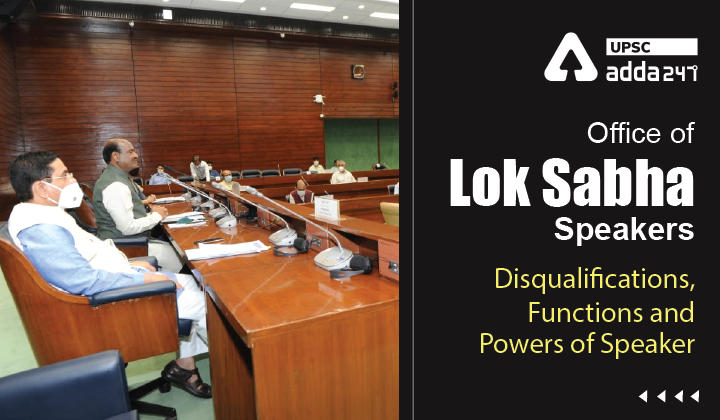Table of Contents
Speaker of the Lok Sabha- Relevance for UPSC Exam
- GS Paper 2: Indian Constitution- Parliament and State Legislatures– structure, functioning, the conduct of business, powers & privileges and issues arising out of these.
Speaker of the Lok Sabha
- The Speaker of the Lok Sabha is the constitutional and ceremonial head of the House who is primarily responsible for managing the functions of the Lok Sabha.
- Presiding Officer: Speaker of the Lok Sabha is the Presiding Officer of the Lok Sabha and in his/her absence Deputy Speaker of Lok Sabha acts as the presiding officer of the House.
- Constitutional Provision: Article 93 of the Indian Constitution deals with both the office of Speaker and the Deputy Speaker of Lok Sabha.
Conditions for Disqualification of Speaker of Lok Sabha
Speaker of Lok Sabha stands disqualified from the office of Speaker of Lok Sabha in the following conditions-
- If Speaker is no longer a Member of Parliament.
- If Speaker tenders his resignation to the Deputy Speaker.
- If Speaker holds the office of profit under the central government or any state government.
- If Speaker is of unsound mind and that too declared by the court of law.
- If Speaker is declared undischarged insolvent.
- If Speaker is no longer a citizen of India or voluntarily accepts the citizenship of any other country.
- If Speaker is removed from the post of Speaker by passing a resolution by a majority of the members of Lok Sabha.
- Speaker does not have any casting vote in case there is a resolution to remove his/her from the office of Speaker of the Lok Sabha.
Powers and Functions of Lok Sabha Speaker
- The presiding officer of Lok Sabha: Speaker of Lok Sabha is basically the head of the Lok Sabha and presides over the sittings of Lok Sabha.
- Presiding Officer of Joint Sitting of the Parliament: the Speaker of the Lok Sabha presides over during a joint sitting of both houses of Parliament (Lok Sabha & Rajya Sabha).
- Independence of Speaker of Lok Sabha: The constitution has made provisions to ensure the independence of the Speaker by charging his salary and other perks to the consolidated Fund of India (CFI).
- Withdrawal of his/her salary from CFI is not subject to a vote of Parliament.
- Order of Precedence: The Speaker of Lok Sabha comes at sixth position in the Order of Precedence of the Government of India.
- Casting Vote: Speaker has a casting vote in the Lok Sabha in case there is a tie between the ruling and opposition party on a matter.
- Sets Agenda of the House: It is the Speaker who decides the agenda of various discussions.
- Quorum and Power of Adjournment: The speaker has the power to adjourn or suspend the house/meetings if the quorum is not met.
- Responsible for ensuring Order in the House: The Speaker ensures the discipline and decorum of the house.
- Power of Suspension: If the speaker finds the behaviour and a member of Parliament is not good, he/she can punish the unruly members by suspending the member from the House.
- Decides whether a bill is Money Bill: The Speaker is the final deciding authority whether a bill brought to the house is a money bill or not. His/her decision, in this case, can’t be challenged.
- Speaker is the final and sole authority to allow different types of motions and resolutions such as No Confidence Motion, Motion of Adjournment, Censure Motion etc.





 TSPSC Group 1 Question Paper 2024, Downl...
TSPSC Group 1 Question Paper 2024, Downl...
 TSPSC Group 1 Answer key 2024 Out, Downl...
TSPSC Group 1 Answer key 2024 Out, Downl...
 UPSC Prelims 2024 Question Paper, Downlo...
UPSC Prelims 2024 Question Paper, Downlo...




